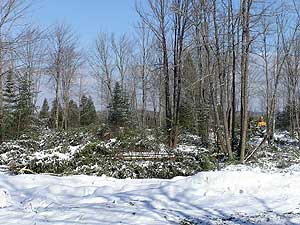|
Audio
Photos
More from MPR
Resources
|
February 25, 2005
Most of the state's electrical power is generated in coal fired power plants. But coal has its critics. Many consider coal a dirty fuel. A new project on the Iron Range will produce a significant amount of electricity from wood. Proponents say the wood burns cleaner than coal; and it's a better fuel for the region's economy.
Virginia, Minn. — Jerry Birchem is logging a stand near Biwabik, in the heart of Minnesota's Iron Range. The logs are destined for the region's paper, pulp, and fiber board plants. But when he's done, there's still a lot of wood left behind. It's the branches, the tops, and other brush and trees that were basically in the way.
Birchem says it's material mills won't take.
"It's most of the stuff when you go through the woods that is in the way of your machines when you go to cut a stand of timber," Berchem says. "When you go in to cut this stand you have a lot of under-story wood that is in your way that you have to either push down and run over or cut it. I feel it's better to cut it and use it for a product than it is just to push it down and then leave it behind in the forest."
He says it looks bad, and it's bad forest management.
Instead he says, the wood can be used as fuel. It's a fuel that's cleaner than coal, Minnesota grown, and completely renewable.
That's the the idea behind the Laurentian Energy Project, a joint venture between Municipal Utilities in Hibbing and Virginia. Each town has a 1920's-era coal fired steam and electricity plant. They're old, inefficient, and in need of expensive upgrades. Now they're planning to add wood fired boilers, to generate electricity they'll sell to Excel Energy, the state's largest electrical utility.
Terry Leoni manages the Virginia Public Utilities. He says it's basic economics. You can send money to Wyoming for coal, or you can spend it on wood in Northern Minnesota.
"We are now looking at generating close to $19 million in wood fuel supply," Leoni says. "Those dollars that we're spending for that stay within a 75 mile economic radius of our two plants."
The plants would need 400,000 tons of firewood chips a year.
It could mean another 200 logging jobs just to keep the plants supplied. And it would be year-round business, not affected by the ups and downs typical when supplying paper and pulp mills.
Half of the plant's fuel would come from so-called closed loop bio-mass; tree farms planted just for this project.
Laurentian Energy has leased 640 acres in Aitkin County, and planted a fast growing poplar hybrid. This tree can shoot up 20 feet in five years, when it's ready to be harvested and chipped for fuel. But they'll need a lot more acreage. They hope to plant old retired pastures and farm fields; county and state lands; even mining waste piles. But Leoni says they're not going to make tree plantations from forests or working farms.
"We certainly are not going after land that already is forested," says Leoni. "The last thing that we want to do is start to decimate the farm community for pasture land; decimate the forest community of trees. That's not what we're about."
The wood burners will save 70 jobs in Hibbing and Virginia. James Kochevar manages Hibbing Public Utilities. Kochevar says both utilities were considering whether it was time to shut the old coal burners down.
"That was definitely one of the drivers behind this project," Kochevar says. "While it's hard to predict how the continued discussions would have gone, at (one) point we had a motion to move out of the generation business, which would have meant closure of our power plant."
The two utilities will add modern wood boilers to their older coal burning plants. The project has just contracted its electrical output to Xcel Energy. Xcel is bound by a 1994 state law to provide a portion of its electrical power from wood based biomass. It's more expensive to produce the power with wood than coal, but having that market makes the plants economically viable.
The Laurentian Energy Project still needs approval from state energy and pollution officials; and it's still looking for seed money - possibly in an upcoming bonding bill. If things go as planned, the wood boilers could be on-line in two years.






